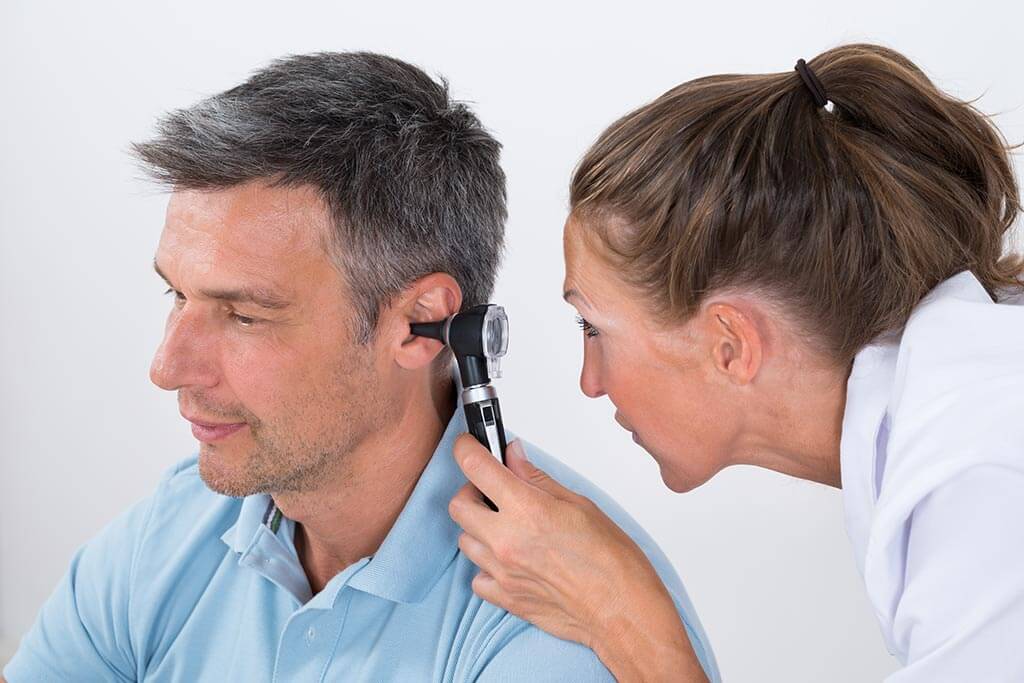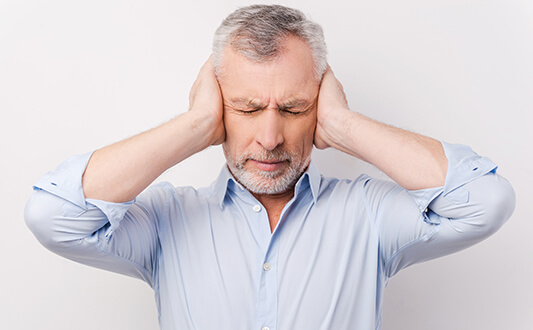Tinnitus is one of the most frequent symptoms with which patients refer to the doctor. This symptom is non-specific. That is, a doctor won’t be able to define the illness right away, as tinnitus accompanies many various pathological processes. Some of them are quite dangerous and can be even life-threatening. Let’s talk about noise in the ears and its possible treatment.
Content
- Objective and subjective symptom
- Causes of objective tinnitus
- Causes of subjective tinnitus
- Consequences of tinnitus
- Treatment of the objective tinnitus
Objective and subjective symptom
Two main types of tinnitus exist:
- Objective – when it can be heard by both the patient and the doctor
- Subjective – when the noise is not heard by anybody else except the patient
Primary task of the doctor during examination of the person with complaints on noise in the ears is determining type of the noise: objective or subjective one. In order to do this the doctor auscultates (listens) the skull with the help of a phonendoscope.
Causes of objective tinnitus
If a doctor can hear the noise, it is considered to be objective. The next task is to define if it coincides with blood vessels pulse. If so, then it probably has vascular origin. If not, then a pathology has other cause.
Vascular tinnitus can be a sign of such pathologies:
- Gomanginoma (benign ear tumor)
- Aneurysm of an artery
- Arteriovenous malformation
All these pathologies require surgical treatment. To determine the true cause of objective pulsating tinnitus, an MRI of the brain and CT of the skull are required.
If the sound does not coincide with pulsation of the blood vessels, it is usually a clicking one – like a machine-gun fire or fluttering of the insect's wings. Then its muscular origin is presumed. Sound can be caused by contractions of the muscles of the soft palate or middle ear.
Causes of subjective tinnitus
It is much harder to find out causes of subjective noise in the ears. Besides, it is not always possible to exclude it completely. The doctor may recommend the following examinations in order to establish the cause of sound:
- Pneumoscopy
- Tympanometry
- Audiometry
According to the results of these tests a doctor can define if it’s auditory or non-auditory noise. If the tympanometry is normal, sound doesn`t decrease with pneumomassage of tympanic membrane, and the threshold of auditory sensitivity is preserved then this is auditory noise. If the pathology of the temporomandibular joint is detected, the intensity of sound decreases after pneumomassage and pathological results of tympanometry are observed, and then this is a non-auditory noise.
There are following types of subjective noise according to the development mechanism:
- Tympanal – caused by damage of the middle ear structures, appears as a result of violation of sound conduction
- Cochlear – the result of dysfunction of cochlear neural structures (it is located in the inner ear)
- Vestibular – is usually accompanied by dizziness or balance disorders
- Cervical – due to the pathology of the bones, vessels or nerves of the neck, including traumatic ones
- Central – caused by the pathology of the brain (cortical area of the auditory analyzer)
- Neuronal – due to the damage to the auditory nerve (it may be compressed by a tumor or nearby vessels)
It’s quite important to reveal the mechanism of sound formation, because it will determine the treatment course in the future.
Consequences of tinnitus
The noise itself usually doesn’t cause any threat to health. At least, it doesn’t reduce life expectancy of the patient. However, this symptom can trigger psychoneurological disorders. Sometimes they are primary, when noise in ears appears against the background of mental disorders. But often they become secondary. Initially a person is disturbed by noisy sounds. Further, the patient develops anxiety disorders and other diseases. This leads to the lower quality of life due to psychological discomfort and can also cause somatic pathology.
Sometimes this is a symptom of a serious illness that causes threat to the life and health of a person. Vascular tinnitus may be a sign of an oncologic process. Often it occurs as a result of the aneurysm formation (local deformation and expansion of the artery) or arteriovenous malformation (pathological connection of the vein with the artery). This is associated with a threat of vascular formation rupture with bleeding. Compression of the nerves, structures of the inner ear and hearing loss are also possible.
Sometimes subjective tinnitus occurs due to damage of the central and peripheral nervous system structures. It can reflect damage of the temporal brain lobe. This type of tinnitus can be caused by various diseases. But in any case damage of the nervous system structures is very dangerous and requires treatment.
Treatment of the objective tinnitus
Often a patient needs surgical treatment. Following pathologies can be removed:
- Tumors of the ear or auditory nerve
- Arteriovenous malformations
- Aneurysms
Sometimes treatment of the organic pathology can be postponed and only observation is provided. If results of the investigations show that the formation is small and doesn`t cause a great threat to the patient, it can be treated without surgery. Sole presence of noise in the head is not an indication for a surgical intervention. Such treatment is carried out only in high risk of negative consequences of the disease.
Tinnitus of muscular origin requires prescription of anticonvulsant drugs. In revealing pathology of ENT organs or chronic inflammatory diseases of the upper respiratory tract, drug therapy is administered.
There are few treatment options in patients with subjective tinnitus, as this symptom can be caused by diverse disorders. Besides, it is not always possible to define them. Depending on a reason, treatment can be conducted by different specialists:
- Pathology of the temporomandibular joint is handled by the dentist
- In case of a brain disease, consultation of a neurologist or a neurosurgeon is required
- In cases of middle or inner ear diseases, an otolaryngologist’s intrevention is required
- Treatment of subjective noise of neck origin is performed by an orthopedist or vertebrologist
Sometimes the cause can`t be clarified. In this case only symptomatic treatment is administered. Doctors can prescribe:
Anticonvulsants. Carbamazepine is usually used in such situation. To understand whether it will be effective, doctors conduct a test with lidocaine that is administered intravenously. If there is at least a minimal positive response to therapy, it is highly likely that administering anticonvulsants will be successful.
Psychotropic drugs are used in patients with accompanying depression or anxiety disorders. They don`t always reduce noise in the ears, but can distract the patient from concentrating on this symptom. Anxiolytic drugs, antidepressants, and less often – antipsychotics are prescribed as a part of the therapy.
Zinc drugs. Lack of this microelement is considered as one of the possible causes of noise in the ears. Therefore, it is prescribed in a dose of 150 mg per day. Sometimes it helps to reduce severity of the symptom.
Antihistamines eliminate the edema of the ENT organs and improve function of the auditory tube. This contributes to better ventilation of the middle ear and it accumulates less liquid. Many antihistamines have additional sedative action, so they alleviate anxiety disorders.
Betagistin may be prescribed to improve cochlear blood flow. It also reduces electrical activity of the vestibular nuclei in the brain. Sometimes metabolic drugs and neuroprotectors are used. Some patients benefit from administering analogues of prostaglandin E1. Studies show that they eliminate the noisy sounds in the ear in every third patient.
Other methods of treatment are:
- Use of a hearing aid with a tinnitus breaker
- External hardware electrical stimulation
- Psychotherapy
- Pneumomassage of the tympanic membrane
To understand nature of the tinnitus and choose appropriate treatment one must to go through the comprehensive examination. Such check-up program can be performed in Germany. German doctors use the latest diagnostic techniques that help to define exact cause of the tinnitus in the majority of cases. Further, you can undergo treatment in one of the German hospitals to get rid of the bothering symptom.
Booking Health will help you to arrange diagnostics and treatment in Germany. We will help you to choose the best hospital, agree on everything with its administration, and provide you with an interpreter. Thanks to our help, you can not only receive high-quality medical services and get rid of worries about organizing a trip, but also get a good discount when booking treatment via the service of Booking Health.
Choose treatment abroad and you will for sure get the best results!
Authors:
The article was edited by medical experts, board certified doctors Dr. Vadim Zhiliuk, Dr. Sergey Pashchenko. For the treatment of the conditions referred to in the article, you must consult a doctor; the information in the article is not intended for self-medication!
Sources:
Centers for Disease Control and Prevention
Read:
Why Booking Health - questions and answers
How to make right decision when choosing the clinic and specialist
7 reasons to trust to the rating of clinics on the Booking Health portal
Don't know where to start?
Contact Booking Health







